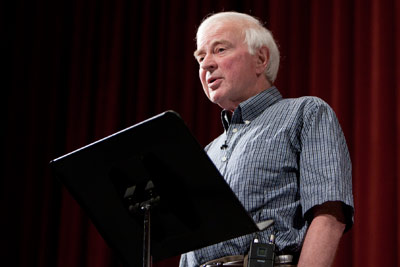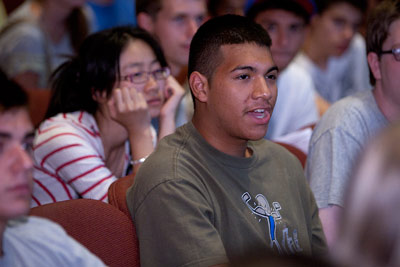'Homer & Langley' faculty lectures explore history, disease, music and social class
By Daniel Aloi




E.L. Doctorow's 2009 novel "Homer & Langley" offers "an interesting and insightful commentary on many of the events of the 20th century," professor of history Richard Polenberg said Aug. 21 in Bailey Hall, in one of six faculty lectures given for the New Student Reading Project.
Polenberg related "10 incidents of history" highlighted in Doctorow's book, from the 1918 influenza pandemic through Prohibition, wars, the civil rights era, and U.S.-backed violence in El Salvador in the 1980s.
While Homer and Langley Collyer were real people who both died in 1947, they live much longer lives in the novel. "Doctorow has taken many liberties with the actual life stories," while taking in real events that exemplified xenophobia, racism, corruption and "the connivance of American government," he said.
"He pays attention to the inhumanity of war and its destructive rather than glorious consequences," Polenberg said. "When Homer returned from World War I, he was a changed man; exposed to mustard gas ... and completely disillusioned, convinced that war does no good."
People in the Collyers' fictional orbit include a young radical Langley falls in love with before she is deported, relating to the Red Scare and Palmer Raids of 1919 that led to more than 500 immigrant deportees. A couple that lives with them in the 1940s is arrested, their only wrongdoing "their Japanese ancestry," Polenberg said. "The Roosevelt administration treated all Japanese-American citizens as if the Bill of Rights had been repealed."
When the brothers confront the counterculture, Doctorow quotes "Mainline Prosperity Blues," a song about drugs by Richard Fariña, who dropped out of Cornell in 1959. "The hippies don't get off lightly" in Doctorow's account of the 1960s, Polenberg said.
Much of the novel's historical commentary is related to Doctorow's bitterness toward the George W. Bush administration, Polenberg concluded, quoting from the author's 2007 address to the American Academy of Arts and Sciences: "His America is a population to be manipulated for the power to be had, for the money to be made," Doctorow said.
Associate professor of entomology Laura Harrington's Reading Project lecture in Willard Straight Hall, on pandemics, emphasized the 1918 Spanish influenza outbreak that killed 50 million to 100 million people worldwide. Contagions like the swine flu pandemic of 2009 and the West Nile virus present a number of challenges and fears, she said, but "we are living in a time when we can be optimistic," with scientific advances on understanding diseases and their prevention.
In the novel, the Collyers' parents both die of Spanish flu, another of Doctorow's factual digressions. "Actually, their father died in 1923, and their mother in 1929," said Polenberg, adding that Willard Straight, Class of 1901, contracted the disease in France in 1918 and died at age 38.
Assistant professor of music Steven Pond lectured in Baker Lab 200 on changing social boundaries in the early 20th century, when musical tastes reflected the gap between "low" and "high" culture.
Homer, entrenched in upper-class tastes, uses the Aeolian player piano to play classical music. But this was becoming a rarity, Pond said, as the rising middle class used it to play popular music.
"People didn't necessarily know how to play piano, but they wanted to aspire to something that was maybe more elevated and tasteful, and so they bought the player piano," Pond said.
Video of all six lectures will be available on CornellCast, http://www.cornell.edu/video. "Homer & Langley" is also being read communitywide through programs sponsored by the Tompkins County Public Library.
Writer interns Elisabeth Rosen '12 and Michelle Spektor '12 contributed to this report.
Media Contact
Get Cornell news delivered right to your inbox.
Subscribe